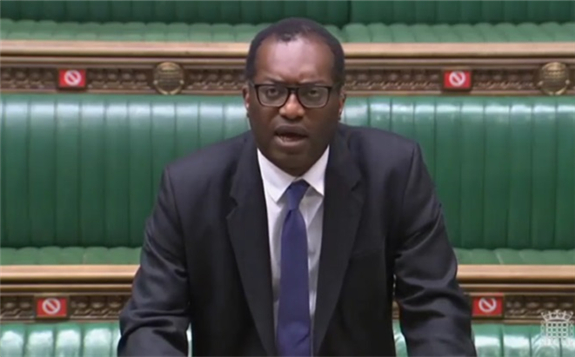 UK Energy Secretary Kwasi Kwarteng (Image: NIA)
UK Energy Secretary Kwasi Kwarteng (Image: NIA)
Citing data from the National Grid ESO, the carbon intensity of electricity - the measure of CO2 emissions per unit of electricity consumed - was about 5% higher year-on-year in the first four months of 2021. Gas-fired generation was 22% higher, driven by the need to meet demand. This was despite the UK spending more weeks under COVID-19 restrictions from January-April 2021 than in the same period in 2020.
"Despite individual record-breaking days, the grid was on average 20% dirtier in April 2021 than in April 2020, with a carbon intensity of 200 gCO2/kWh," the statement reads. "Decarbonising the grid is essential to hitting the government’s new target of a 78% reduction in emission by 2035, and net zero by 2050. Clean electricity will be required to power new fleets of electric vehicles, home heat pumps, and green hydrogen production, the first steps in decarbonising the rest of the economy."
To accelerate progress, the associations are calling for a rise in the carbon price to be consistent with delivering grid decarbonisation by 2035, as well as the following actions:
RenewableUK is calling for government to set specific 2030 deployment targets for key renewable technologies by 2030: 30GW of onshore wind, 2GW of floating wind, 5GW of green hydrogen electrolyser capacity, in addition to 1GW of marine energy in the 2030s;
Solar Energy UK is calling for a specific government target of 40GW solar deployment by 2030, and to support this by reinstating funding and ending VAT for green home upgrades, reforming business rates for large solar roofs, and providing annual CfD auctions for solar until the end of the decade.
The NIA is calling for the government to endorse a financing model for new nuclear projects this year and to set out a plan to restore nuclear capacity to existing levels by the early 2030s.
NIA Chief Executive Tom Greatrex said: "We need to invest in a new generation of nuclear stations to hit net zero and help level up the country. We know that nuclear and renewables work well together to cut emissions, and that strong low-carbon energy mix is our future."
On 18 May, the government announced it will bring forward legislation further committing itself to creating more nuclear power.The announcement was made by Kwasi Kwarteng, secretary of state for Business, Energy and Industrial Strategy, in a statement in the House of Commons marking six months since the publication of the Prime Minister’s 10 Point Plan for a Green Industrial Revolution.
Greatrex said: "We warmly welcome the Secretary of State’s confirmation that the government will bring forward legislation for a new model of nuclear financing in this Parliament. This is the key to cutting the cost of capital and driving investment in new projects. We urge the government to introduce the legislation as soon as possible, so we can get on and build the nuclear capacity we need to hit net zero and create good jobs across the country."